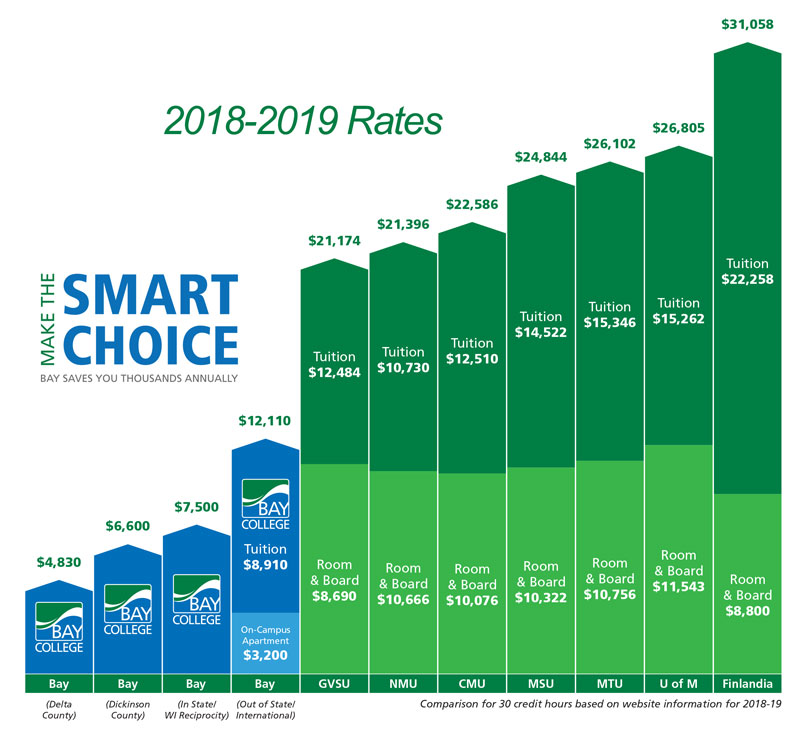
The media is full of commentaries questioning the benefits of going to college. They often cite the experiences of students who attend big schools and graduate (or not!) with tens of thousands of dollars in student loan debt.
 Meanwhile, some claim, the starting salary of college graduates is not much higher than that of high school graduates. So what should you do? Keep reading if you want to know the truth: Is college worth it? Is it for me?
Meanwhile, some claim, the starting salary of college graduates is not much higher than that of high school graduates. So what should you do? Keep reading if you want to know the truth: Is college worth it? Is it for me?
Benefits of Higher Education
The US Bureau of Labor Statistics data consistently shows that education makes sense. Both associates and bachelor degrees lead to higher employment rates and incomes. In fact, a student with an associates degree will earn about  $400,000 more in their lifetime than those with a high school diploma!
$400,000 more in their lifetime than those with a high school diploma!
Those with higher education also show higher levels of saving, increased personal/professional mobility, improved quality of life for their offspring, better consumer decision making, and more hobbies and leisure activities!
Should you be interested in transferring to a four-year university, the lifetime pay increase jumps even higher. According to a study by the Economic Policy Institute, college can lift lifetime wages by as much as $1 million. Plus it is a hedge against unemployment: the higher the level of education, the lower the unemployment rate. Presently, those with a high school diploma have an unemployment rate of 3.9%, but only 2.1% for college graduates.
 Best Kept Secret
Best Kept Secret
Want to know a secret? More than 47% of college students in the United States now attend two-year colleges, and they are becoming increasingly popular for students with all kinds of goals.
Okay, so that’s not really such a big secret. But you might be surprised to learn just how much two-year colleges have to offer prospective students. You can complete a year or two of studies at a fraction of the cost of a four-year school, and then transfer to a university of choice. Programs that take only a year or two to complete can prepare you for a fast-track career, a great job with high earnings in dozens of career areas. Whatever your goals, Bay College can help you get there.
 Where to Start
Where to Start
The first thing to do is develop a game plan for academic success. Making the transition to attend college is challenging for every student, no matter what age. Starting at a community college can allow you to make yourself career ready and ease the transition to higher education without taking on big financial obligations.
In most cases, community college students can commute to class, work a full or part-time job, and complete their studies with little or no debt in a manageable timeframe. Bay College offers financial assistance, an array of support services and course flexibility online or on campus to fit your busy schedule.
 High-quality Instruction
High-quality Instruction
Some people assume that because it costs less to attend a community college, students must settle for a second-rate educational experience. What they often find out when they enroll is the secret of quality. Students attending community college complete their programs and basic academic requirements with top notch instructors who are dedicated to teaching and helping students achieve their goals rather than researchers. Instructors thrive on direct contact with students and focus their energies on the classroom experience.
Personal Attention
Smaller classes in community colleges mean a better instructor-to-student ratio, more involved students, and greater overall success and confidence. Instructors give their full attention to students within smaller class sizes — typically 10 to 24 students versus large lecture halls at four-year universities, with often 300+ students in a single lecture. Personal attention also comes in the form of advising. Bay advisors work with you throughout your experience – helping you plan your class schedule, linking you with resources, and following up on your academic progress.
Local Partnerships, Local Jobs
Community colleges such as Bay work directly with local businesses and industries and are equipped with the latest technologies, classrooms and facilities. These state-of-art capabilities are not purchased with enormous student tuition rates. They are the result of partnerships between the college and local community. If you’re looking to enter the workforce sooner rather than later, the College’s relationships with local employers offer job opportunities upon completion, or often paid internship experiences.
 Support to Succeed
Support to Succeed
Student success is the top priority at Bay College. All students are paired with an advisor. Resources are accessible to all students. Support services include free tutoring, success coaching, special accommodations, confidential counseling, peer mentors, free online textbooks food pantry, career closet, and more. Study zones are also available throughout campus, plus a library and student success centers to assist with writing, math, testing, time management, study skills, computing needs, careers, and more. It is all at the HUB.
Social Advantages
We understand that every student brings a unique background and diverse dreams to his or her education. There’s more to college than classrooms and textbooks. Bay seeks to provide opportunities for all students, including a free YMCA membership. Students can participate in athletics, student activities, gaming, student clubs, veteran services, professional organizations and more. Get involved and expand yourself. GO NORSE!
Four-year Transfer Options
Do you know that 42% of Bachelor’s Degree recipients start at a community college? Time spent at community college saves you $10,000s in tuition costs, many time avoiding college debt.Bay College has transfer programs and articulation agreements with highly sought universities, providing direct pathways. Advisors work with each student on transfer options available to help ensure a seamless transfer process. Four-year schools are always looking for students who have a proven record of academic success in higher education, and scholarships available to reward high-achieving transfer students.
Overall…
Yes, college is worth it! Talk to Bay College about financial aid, scholarships, job opportunities, seamless transfer options, and how we can help! Contact admissions at 906.217.4010, stop in, or schedule a campus visit – you will be amazed!
$400,000 Lifetime Pay Gap
Between an Associate’s degree and a high school diploma
Source: Georgetown University Center and the Workforce
$960,000 Lifetime Pay Gap
Between a Bachelor’s degree and a high school diploma
Source: Georgetown University Center and the Workforce
4.8% Unemployment Rate
High School graduates
Source: Bureau of Labor Statistics
2.8% Associate degree holders
Source: Bureau of Labor Statistics

